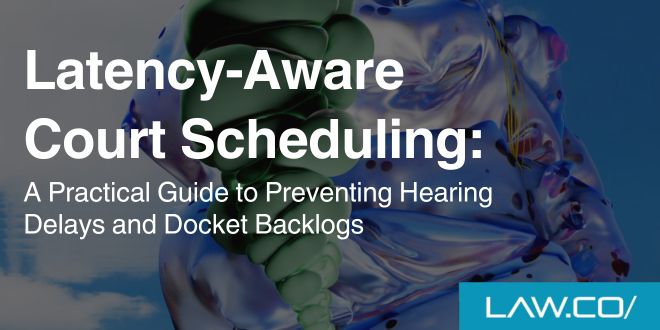

SEO Considerations for Your Law Firm Website Redesign
SEO optimization is crucial for the success of any law firm’s website. It can be daunting when redesigning your law firm's site and figuring out how to ensure maximum visibility in search engine results pages (SERPs).To make it easier, this comprehensive guide will provide a checklist that outlines all the essential steps you need to take.We will also discuss tracking progress via various tools which help analyze data-related activity pertaining directly to its processes mainly used by proven Search Engine Optimization Professionals these days. Throughout this article, we have taken care of even seemingly less important matters so stay tuned!
1. Keyword Research
Importance of keyword research in SEO optimization
Keyword research is essential for effective SEO optimization. When done correctly, keyword research helps identify the phrases and search terms that potential visitors are using to locate law firms like yours online.Knowing what words people are searching for can help you create content specifically tailored to their interests and needs – resulting in better organic visibility on SERPs (Search Engine Results Pages). Additionally, incorporating the right keywords into your website copy will allow search engines such as Google or Bing to properly index pages so they appear when searchers make queries related to those topics.
Tools and Strategies for effective keyword research

SourceEffective keyword research is essential for the SEO optimization of law firm websites. Tools such as Google AdWords and Ubersuggest can help identify popular search terms related to a legal topic that potential clients may use when searching online.Additionally, tools like Keyword Tool Pro and AnswerThePublic allow users to view relevant ‘long-tail’ keywords not established in the database yet with high volumes of monthly searches that are indicative of market trends or emerging topics within your field.When selecting the right keywords for your website design remember accuracy, specificity, and relevancy; all of which will guide you into finding toward conquering competitive positioning on SERPs (search engine result pages).
Tips for selecting the right keywords for your law firm website
Effective keyword research is essential for SEO optimization of law firm websites. Tools such as Google AdWords and Ubersuggest can help identify popular search terms related to a legal topic that potential clients may use when searching online.Additionally, tools like Keyword Tool Pro and AnswerThePublic allow users to view relevant ‘long-tail’ keywords not established in the database yet with high volumes of monthly searches that are indicative of market trends or emerging topics within your field. When selecting the right keywords for your website design remember accuracy, specificity, and relevancy; all of which will guide you into finding toward conquering competitive positioning on SERPs (search engine result pages).
2. On-Page Optimization
Explanation of on-page optimization and its importance
On-page optimization is the act of optimizing a website's pages to improve its visibility in search engine results. It involves making changes within your site that maximize overall ranking potential and establish relevancy with target keywords and phrases. On-page optimization helps search engines understand what content on each page is about, as well as how it relates to other web pages across the internet.Also, successful implementation can lead to higher rankings for individual pieces of content while helping users easily find the information they are looking for related directly back fits into their query.
Elements of on-page optimization, including title tags, meta descriptions, header tags, and internal linking

SourceOn-page optimization is key for a successful SEO campaign. Elements such as title tags, meta descriptions, header tags, and internal linking are all important components to drive user engagement on your website. Title tags should be concise yet descriptive of the page content; they act like mini headlines that give people an idea of what they can expect from the webpage before clicking it.Meta description offers another means of communication with potential visitors by giving them some context about what’s included in the webpage without having to click on it first. Headers are used within webpages to track changes between various topics on one site which helps search engine bots better understand each section's purpose while internally linking shines a light on higher-level concepts encompassed throughout a website helping spread link equity around more effectively and efficiently when done right.
Best practices for on-page optimization for law firm websites
On-page optimization should be tailored to the specific needs and goals of a law firm website by focusing on title tags, meta descriptions, header tags, and internal linking.Best practices for optimizing these elements include:
- Creating unique titles that accurately represent each page’s content
- Writing succinct yet compelling meta descriptions that draw visitors in
- Using optimized headings within pages throughout the site hierarchy structure (H1 through H6)
- Incorporating relevant keywords into anchor text when link building internally among webpages
- Streamlining navigation paths as much as possible—aiming for 3 clicks or fewer from any given webpage to another one–etc.
3. Content Creation
Importance of high-quality and relevant content for SEO optimization

SourceCreating high-quality and relevant content for SEO optimization is essential to both improve your website's ranking in search engine results pages (SERPs) and engage website visitors. Not only does good, keyword-focused content help capture a page’s target audience but it also helps build trust between them with the law firm as well as answers their questions about legal services being provided.Content creation targeted towards keywords can help draw organic traffic from SERPs while unique, compelling copy encourages actively looking users to stay on the site longer – leading further along into conversion funnels of possible clients or leads!
Strategies for creating content that targets keywords and engages website visitors
High-quality content is a critical component of SEO optimization for law firm websites. It helps engage website visitors while also signaling to search engines that the website provides value on relevant topics. When creating content, it’s important to target keywords and phrases related to your practice areas while providing valuable information in an engaging format like blog posts or infographics.Additionally, incorporating multimedia elements such as images and videos can help create a more interactive experience for readers which may lead them to interact with other pages on the site or contact your office regarding any legal inquiries they have after reading one of your articles/posts.
Tips for creating content that showcases the expertise of your law firm
Creating content that showcases the expertise of your law firm is key to SEO optimization success. When creating and curating blogs, press releases, articles, or website copy for your law firm's site it is important to focus on both quality and relevance.Your writing should always be clear and easy to understand with a business tone that resonates with potential clients. Additionally, you may want to include case studies as well as showcasing successful outcomes from past cases won or dealt with by your legal team in order demonstrate credibility while simultaneously optimizing visibility via relevant keywords/phrases used within such stories thus improving overall rankings.
4. Technical Optimization
Explanation of technical optimization and its importance
Technical optimization is the process of ensuring that your website meets technical specifications to help it achieve higher rankings in search engine results. It includes elements such as enhancing site speed, mobile responsiveness, and implementing schema markup, which can have a major effect on user experience and SEO performance.Technical optimization ensures that Google bots crawl through all content more efficiently with minimal errors or issues, meaning websites are indexed quicker for relevant queries. Additionally, this improves users' experiences when they visit your website resulting in better engagement metrics and higher click-through rates from SERPs.
Elements of technical optimization, including website speed, mobile responsiveness, and schema markup
Technical optimization is a key element of effective SEO since it enables search engine crawlers to easily read and index your website's content. Elements of technical optimization include things like:
- Website speed - making sure that the pages load quickly on both desktop and mobile devices;
- Mobile responsiveness - ensuring that all users have an optimal experience regardless device they're using;
- Schema markup – adding tags for specific page elements so that these are included in SERP listing results.
These measures together contribute greatly towards providing better user engagement with law firm websites and will also help boost their overall rankings in organic searches.
Best practices for technical optimization for law firm websites
- Optimizing images with alt tags and compressing them while also optimizing code by minifying HTML/CSS
- Reducing redirect requests
- Using browser caching correctly and making sure that plugins are up-to-date across all pages.
- Additionally implementing SSL certificates ensures data transmission security resulting in improved rankings in SERPs.
5. Off-Page Optimization
Explanation of off-page optimization and its importance

SourceOff-Page Optimization is an integral part of SEO optimization for law firms. This consists of building high-quality backlinks and leveraging social media to increase one's online presence. In regards to building links, it’s important that only trustworthy sources are used as ones coming from low-quality sites can lead worsens rankings in SERP results.Social media channels such as Facebook or Twitter provide immense opportunities for businesses when leveraged correctly; this means using the platforms to share content consistently and engaging with users who comment on their posts to maximize effective brand awareness across multiple digital marketing channels.
Strategies for building high-quality backlinks to your law firm website
Off-page optimization focuses on strategies for building and cultivating backlinks from other websites. These “votes” of credibility help show search engines that your law firm website is authoritative, trustworthy, and relevant in online searches.When pursuing high-quality links to your site, focus exclusively on quality over quantity—search engine algorithms now prioritize valuable content above all else when it comes to ranking sites organically.There are several tried and true methods for garnering these types of external links:
- Syndicating industry experts' quotes
- Guest blogging, on-site blogging or submitting articles with natural link citations
- Identifying promotional partnerships within the legal ecosystem as well as listings in local business directories like Yelp or Avvo.
Tips for leveraging social media to improve SEO for your law firm
Off-page optimization is an important part of SEO that involves building links to your website from external websites. One great way for law firms to leverage off-page optimization is through social media platforms such as Facebook and Twitter.Creating accounts on these sites can help spread awareness about the firm, attract visitors back to the site, and ultimately improve rankings with search engines.Additionally, using hashtags related to legal topics or services offered by the firm when posting content can further draw attention and highlight a strong presence in their industry online – all while boosting overall organic visibility within SERPs (search engine result pages).
6. Local SEO
Explanation of the importance of local SEO for law firms
Local SEO is an important part of any website redesign for law firms. Local SEO helps increase visibility in localized search results and can bring more qualified leads to your firm's website from local customers searching online for legal services.Optimizing the content, tags, graphics, and other elements of a webpage with relevant keywords that are specific to each geographic location where you practice law, will help improve the ranking on these searches which enables clients within those areas to find you quickly when looking up lawyers near them or related queries.Doing so will also ensure that potential clients see accurate information about the greatest directions/links to your office locations as well as timely news updates regarding events affecting their communities.
Strategies for optimizing your law firm website for local searches

SourceLocal SEO plays an important role in the success of a law firm's website. To maximize the benefit of local search, it is recommended that you create content aimed at your target audiences by location and list out any service areas explicitly on your site.Additionally, get listed with well-known directories such as Google My Business to increase visibility for people searching within certain geographic locations; moreover register with lesser-known directory sites specific to lawyers/law firms or relevant business sectors like legal services.Lastly, promote customer reviews; this will further improve results related to local searches showing trustworthiness in those listings which appear higher up when users are selecting their desired businesses.
Tips for building local citations and reviews to improve your law firm's online presence
Local SEO can be a powerful tool for improving your law firm’s online presence and boosting search engine visibility. To maximize the effectiveness of local SEO, it is important to build citations from highly respected websites that are related to your services or industry.Collecting reviews from satisfied clients who have used your services in the past can also help drive more exposure to your website by highlighting personal experiences with you and sending positive signals about quality service provision in search rankings.Additionally, these reviews often act as social proof which will encourage potential customers considering using their legal solutions to seek out consultative advice so they may hear independent feedback prior to making decisions involving engagement with their professional services.
7. Tracking and Measuring SEO Success
Explanation of the importance of tracking and measuring SEO success
Tracking and measuring SEO success is essential for law firms looking to improve their online presence.Having the right tools in place allows you to easily track website traffic, keyword rankings, backlinks, and other metrics that can provide insights into how successful your strategies are. This data should be used as a basis for refining your approach so you can continually optimize your law firm's SEO performance over time.
Tools and strategies for tracking website traffic, keyword rankings, and backlinks

SourceTools such as Google Search Console and various analytics tools allow you to track website traffic, keyword rankings, and backlinks.Using a combination of these tools enables you to monitor your law firm's performance in relation to key metrics like impressions and clicks, organic search position visibility rate (SERP CTR), average ranking positions on targeted keywords, pages with high/low bounce rates or returning visitors, etc.Additionally having an understanding of trends in weekly reports will help enhance your SEO outcomes over time by allowing for further optimization opportunities.
Tips for using data to improve SEO performance for your law firm website
By tracking and measuring SEO performance, law firms can identify which strategies are working best to improve their visibility online.They should track website traffic, keyword rankings in search engine results pages (SERPs), backlinks from other websites/pages, conversion rates for forms or calls-to-action on the site itself etc., as well as use tools like Google Analytics to measure user engagement with content.Using data gathered throughout their optimization process will help pinpoint weak areas that need attention so they can be proactively addressed rather than waiting until it’s too late when users have already had a poor experience on the website due its lack of usability or relevancy related issues.
Conclusion
In conclusion, SEO is a critical component of any website redesign for law firms as it can help them gain visibility online and reach more potential clients. To ensure the best results from your efforts, it's important to research relevant keywords, create high-quality content that targets these keywords and engages visitors on their terms, and optimize webpages with elements like title tags and header tags while making sure they are technically optimized for speed and frictionless UX across devices.Finally, offsite optimization such as building backlinks through social media sharing or local citation is also an essential part of a successful campaign which helps in getting found by people searching locally too.Through tracking data related to keyword ranking performance & traffic should be monitored over time - allowing you to use this information to tweak page titles when needed & other technical issues affecting search rankings may arise along the way – all helping improve user experience (UX) design/architecture at every step of the journey towards better ROI decisions!Looking for legal marketing services that fit within a tight SEO budget?Contact us for more detail!

%201.svg)










